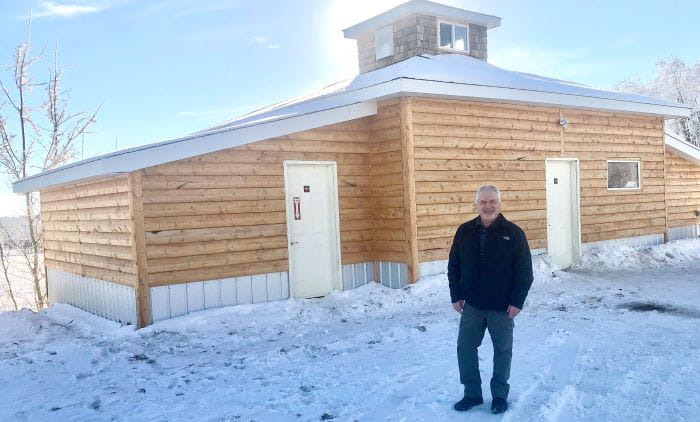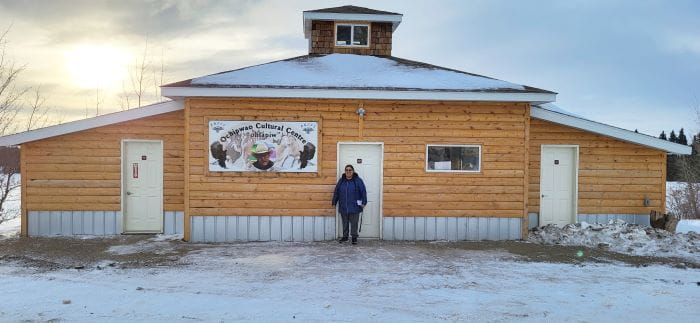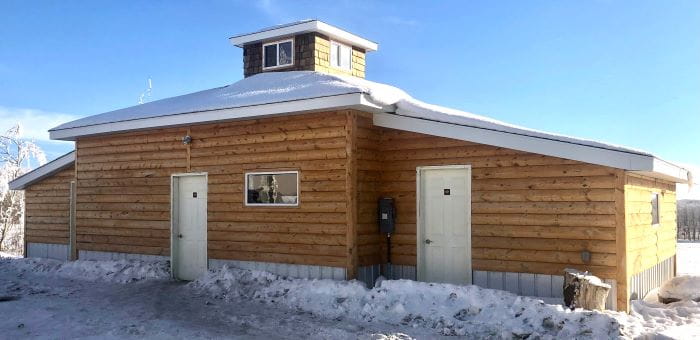For Fred Tarr and Ira Horse, saving space for youth to reconnect with traditional First Nations culture has been a profound personal and professional quest.
The pair worked together in youth corrections at the former North Battleford Youth Centre (NBYC) and were a driving force to get the cultural lodge from that site donated to Thunderchild First Nation on Treaty 6 Territory by the Ministry of Corrections, Policing and Public Safety. When they celebrated the reopening of the Ochipwao Cultural Centre in December 2022, their shared vision for cultural connection came full circle.
A Cultural Tie
In the 30 years he spent working with youth in custody at NBYC, Fred witnessed the significant positive impact of cultural teaching. He says many young people came in with limited ties to their heritage and traditional cultures but were motivated to engage in ceremonies.
“Those youth who were able to connect with our Elders, connect with their culture – they took those teachings back to their community with them,” Fred said. “In my opinion, they worked hard, and it went a long way in reducing some of the risk factors for coming back to custody.”

As of 2022, every provincial custody facility in Saskatchewan has a dedicated cultural lodge, including many new builds. Fred says the cultural lodges are more meaningful than running programs in regular classrooms or buildings. They are places of respect and ceremony that provide a cultural tie and access to Elder teachings and sweat lodges 365 days a year.
When he learned that NBYC was closing, Fred was inspired to get the cultural lodge on the site transferred to a place where it could continue to serve its original purpose to reconnect youth to culture.
“I felt that this fell quite in line with some of the Truth and Reconciliation recommendations, especially the healing of culture,” said Fred who was the Director of First Nations and Métis Services for Custody, Supervision and Rehabilitation Services before he retired.
Journey to Thunderchild
Fred discussed the idea to donate the lodge with Ira, a friend and former coworker who shared his connection to the building and the youth facility. Ira is now a cultural resource worker for Awasisak Nikan Child and Family Services on Thunderchild First Nation. She told Fred about organizing youth cultural programs such as Cree language teachings, land-based training, regalia and drum making, and Elder protocol teachings and gatherings. She noted that there was often a challenge to find time and space to run these programs out of the local school, health centre or office buildings. It sounded like an ideal place.
Ira also remembered the cultural lodge and the influence the space and teachings had on the youth in custody.
“The respect is there for the building, and I think it’s going to really benefit the kids here like I know it did over there (at NBYC). When I worked there when those kids did a sweat ceremony, we didn’t have any incidents,” Ira said. “The kids, I think deep down they still have that level of respect for the Kokum figure, the elder lady. They still respect the teachings, and they still respect our land no matter what.”

In February 2021, Thunderchild First Nation Awasisak Nikan Child and Family Services submitted an official proposal to SaskBuilds and Procurement about the programs the space would be used for. The donation was approved by the Ministry of Corrections, Policing and Public Safety, and the plan was set in motion. Due to the high cost of moving the entire building, Thunderchild sent contractors to the site of the decommissioned NBYC in March 2021. It was deconstructed and moved on trailers 119 kilometres northwest of the city to its new home.
Before they moved the building, Ira said the community Elders met and held a pipe ceremony to decide on the best location. They followed traditional protocols to choose the best spot on the land and held a pipe ceremony and sod turning ceremony to smudge the land.
Once the building arrived, contractors set to work on the project of refurbishing the lodge with new cedar siding. The floor in the lodge is also designed to be lifted off to expose the bare earth. Ira explained that this is significant because sweat lodges are formed by hand with willows that are bent a certain way and cannot be set on top of any kind of artificial flooring like cement, wood, or tile.
Reconciliation and Renewed Purpose
Fred officially retired from government on Indigenous Peoples Day, June 21, 2021, and the donation of the cultural lodge became the final project highlight to cap off his career in corrections. At the time, the lodge was still being refurbished at Thunderchild, and the risk of COVID-19 made it difficult to hold gatherings. When the building was complete everyone was able to attend the official opening ceremony in December 2022, Fred said the experience rekindled his heart.
“I know as a youth I was disconnected from my culture and being a survivor of the 60s Scoop and a Métis youth, unfortunately I lost a lot of my culture,” Fred said. “Watching and assisting youth to be able to reconnect with their culture makes my heart full.”
Ira shares a sense of pride and appreciation that this former corrections building can now benefit families and children on Thunderchild.
“If we don’t hang on to these cultural teachings now, they’re not going to be there in the future,” Ira said. “I found it really heartwarming knowing I was part of this because I’ve always worked with Elders, I’ve always tried to preserve our culture to the best of my ability including our language.”
She noted that partnerships and gestures like this donation are a step in the right direction towards reconciliation and rebuilding better relationships between First Nations and government.
Ochipwao Cultural Centre “Ohtapiw”
Elders agreed to name the lodge Ochipwao Cultural Centre after a local elder who recently passed away. The Cree word “ohtahpiw” is also written on the sign, meaning “he sits here”. While he did not carry the pipe, Ira said he understood traditional protocols and was always available to share his cultural knowledge with the community.
“He was my mentor and a mentor to a lot of people here. So his teachings are going to be there forever,” Ira said.
The Ochipwao Cultural Centre is a shared space for the whole community to enjoy. Ira says the Little Warriors and Little Plumes programs are similar to Girl Scouts and Boy Scouts but with a traditional cultural focus on making and learning to drum and sing and making regalia for powwow dancing. The youth learn about traditional herbs, ceremonies and protocols along with skills like hunting and building fires. Elders also use the space for gatherings and feasts.

For Ira, the space creates a different atmosphere than running programs out of a school or another building where there are more distractions. The proof of the influence of a designated cultural space shines through in the words of her own 11-year-old adopted son.
“When he went to programming at the lodge, he said ‘Mom, we smudged, and I saw Mushum’s picture, and I behaved there. To hear my 11-year-old boy say that when he walks in that building, he is respectful because we smudge and because it’s a Mushum building and because we learn good things – that means a lot.”
